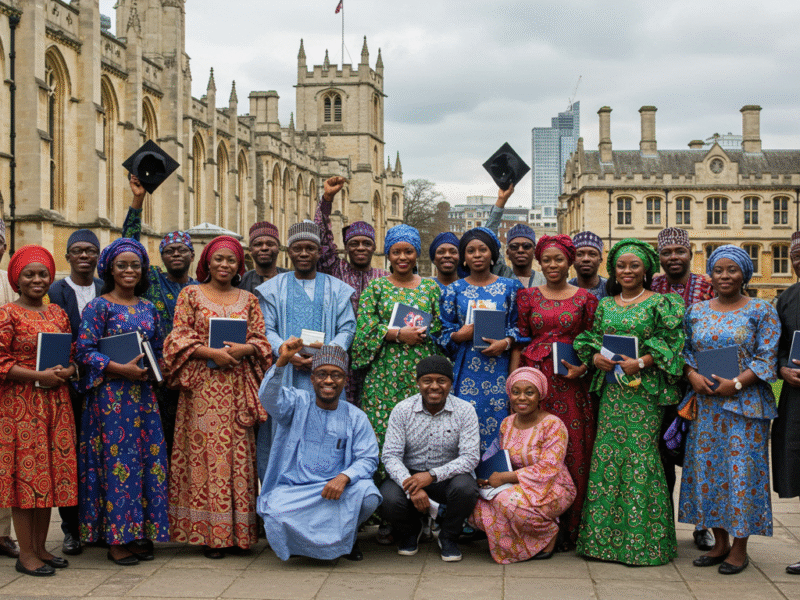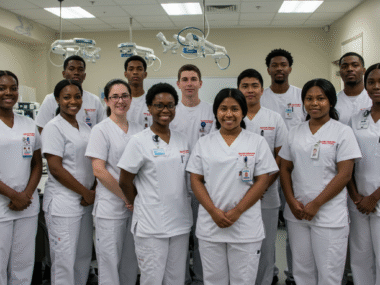Studying abroad can feel like a giant leap, especially when you’re from Nigeria and eyeing top-tier education in the United Kingdom. But here’s the good news: there are numerous scholarships designed specifically to help Nigerian students pursue advanced degrees like Master’s and PhD programs. These opportunities often cover tuition fees, living expenses, travel costs, and even health insurance, while also guiding you through the UK student visa process. This comprehensive guide explores everything you need to know about securing UK scholarships for Nigerians, from finding the right programs to navigating visa requirements. Whether you’re a fresh graduate or a working professional aiming higher, these insights could be your ticket to world-class education.
Why Choose the UK for Postgraduate Studies?
World-Class Universities
The UK is home to some of the world’s best universities, such as Oxford, Cambridge, Imperial College London, and the University of Edinburgh. These institutions lead in cutting-edge research across fields like engineering, medicine, business, environmental science, and social sciences—areas where Nigerians are making significant global impacts. A UK degree not only enhances your knowledge but also boosts your career prospects in Nigeria and internationally.
High Costs and the Need for Scholarships
Pursuing a Master’s or PhD in the UK comes with a hefty price tag. Tuition fees for international students range from £15,000 to £40,000 per year for Master’s programs and can be even higher for PhDs. Living expenses, especially in cities like London, can reach £1,200 monthly. Scholarships are a game-changer, making these opportunities accessible to talented Nigerians who might otherwise find the costs prohibitive.
Top UK Scholarships for Nigerians
Chevening Scholarships
Overview and Benefits
Funded by the UK Foreign, Commonwealth & Development Office (FCDO), Chevening Scholarships are prestigious awards for future leaders. Each year, over 1,500 scholarships are awarded globally, with a significant number allocated to Africans, including Nigerians. Ideal for those passionate about public policy, international relations, or sustainable development, Chevening covers full tuition, a monthly stipend of approximately £1,200, return flights, and an arrival allowance.
Eligibility and Application
To qualify, you need a bachelor’s degree (minimum 2:1), at least two years of work experience, and leadership potential. Applications open in August, with deadlines typically in November. You’ll need to submit essays on leadership, networking, and your study plans via the Chevening online portal.
Commonwealth Scholarships
Types of Commonwealth Scholarships
Managed by the Commonwealth Scholarship Commission (CSC), these scholarships target students from developing Commonwealth countries like Nigeria. The Commonwealth Master’s Scholarships fund one-year taught programs, while Commonwealth PhD Scholarships support up to three years of research. Both cover tuition, living expenses, and family allowances where applicable.
Eligibility and Application Process
Applicants need a first-class or upper second-class bachelor’s degree, relevant work experience, and a clear plan on how their studies will benefit Nigeria. Applications open around August, and some require nominations from Nigerian universities. Check the CSC website for deadlines, typically in December.
University-Specific Scholarships
Clarendon Fund Scholarships (Oxford)
The University of Oxford’s Clarendon Fund offers around 130 scholarships annually to students of all nationalities, including Nigerians. It covers Master’s or PhD programs in any subject, funding full tuition and providing a living grant of at least £15,000. Nigerians have excelled in fields like law, economics, and health sciences.
Gates Cambridge Scholarships (Cambridge)
Funded by the Bill & Melinda Gates Foundation, these scholarships target global leaders tackling issues like poverty and climate change—areas resonant with many Nigerians. They cover tuition, living costs, conference attendance, and even hardship funds for Master’s and PhD students.
Rhodes Scholarships (Oxford)
The Rhodes Scholarships, available through global or Africa streams, support postgraduate study at Oxford. They emphasize character, intellect, and commitment to service, making them ideal for Nigerians aiming to influence policy or innovation. Benefits include full funding and access to a prestigious alumni network.
Other Notable Scholarships
Canon Collins Scholarships
Focused on social justice and human rights, these scholarships support postgraduate study in the UK for Africans, including Nigerians. They’re ideal for those in law, education, or development studies.
Tullow Oil Scholarships
Aimed at Africans in the oil and gas sector, these fund Master’s programs in engineering or geosciences at universities like Aberdeen or Heriot-Watt. Nigerians in energy-related fields can benefit significantly.
Dorothy Hodgkin Postgraduate Awards
Targeting outstanding female scientists from developing countries, including Nigeria, these awards support PhD studies in STEM fields, promoting gender diversity in academia.
AWARD Fellowships
The African Women in Agricultural Research and Development (AWARD) Fellowships sometimes partner with UK institutions to fund PhD research in agriculture or food security, empowering Nigerian women in these sectors.
Eligibility and Application Requirements
Academic Excellence
Most UK scholarships require a minimum of a 2:1 bachelor’s degree. For PhD programs, a Master’s degree and a strong research proposal are often necessary. Academic transcripts and references (at least two academic) are standard requirements.
English Proficiency
Since English is the medium of instruction, you’ll need IELTS (minimum 6.5 overall) or TOEFL scores. Some universities accept alternative tests or waive this for Nigerians educated in English-medium institutions.
Work Experience and Leadership
Scholarships like Chevening and Commonwealth prioritize candidates with professional experience—typically two to five years. Demonstrating leadership, whether through community projects or workplace initiatives, strengthens your application.
Ties to Nigeria
To satisfy visa and scholarship conditions, you must show intent to return to Nigeria post-study. This could be through a career plan, like applying your UK-acquired skills to address Nigeria’s challenges in healthcare, education, or technology.
Application Strategies
Crafting Winning Essays
For Chevening, write compelling essays:
- Leadership: Share a story of leading a project, like organizing a community health initiative in Lagos.
- Networking: Describe building partnerships, perhaps with NGOs or academic institutions.
- Study in UK: Explain why your chosen university and program align with Nigeria’s needs, like renewable energy solutions for power shortages.
For Commonwealth, the development impact statement is critical. Link your PhD research to Sustainable Development Goals, such as poverty reduction through fintech innovations.
Gathering Documents
Prepare these early:
- Academic transcripts
- Two to three reference letters
- Updated CV
- Personal statement tailored to each scholarship
- Research proposal (for PhD)
Timing and Deadlines
Most scholarships open between August and November, with deadlines in December or January. University applications, often via UCAS or directly, have January deadlines for September starts. Apply to 3-5 universities to increase your chances.
Navigating the UK Student Visa Process
Understanding the Student Visa
Since 2020, the UK student visa replaced the Tier 4 visa. For Nigerians, apply online via the UK Visas and Immigration (UKVI) website. Key requirements include:
- Confirmation of Acceptance for Studies (CAS): Issued by your university.
- Proof of Funds: Even with a scholarship, show maintenance funds for 28 days (often covered by a scholarship letter).
- TB Test: Required from an approved clinic in Nigeria.
- Visa Fee: Approximately £348, plus a £470 yearly healthcare surcharge.
Application Process
Apply up to three months before your course starts. Processing takes about three weeks, but apply early to avoid delays. Visa centers in Lagos and Abuja may require interviews. Ensure all documents are complete to avoid refusals, which often stem from missing financial proof or weak ties to Nigeria.
Bringing Dependants
If your course exceeds nine months, spouses and children under 18 can join on a dependant visa. Provide proof of funds for their maintenance and show your relationship (e.g., marriage or birth certificates).
Living in the UK as a Nigerian Scholar
Accommodation
University halls cost £100-£250 weekly, with options for private rentals. Book early through university portals. Nigerian student societies can guide you to affordable options.
Food and Culture
Stock up on Nigerian staples at African markets in London or Manchester. Cities like London have Nigerian restaurants in areas like Peckham, offering jollof rice and egusi soup. Join cultural societies to ease homesickness.
Part-Time Work
You’re allowed to work up to 20 hours weekly during term time. Jobs like tutoring or retail can supplement your stipend, with hourly rates around £10-£15.
Cultural Adaptation
Expect cold weather—pack warm clothes! UK courses are intensive, so master time management. Engage with Nigerian diaspora communities, with over 200,000 Nigerians in the UK, for support.
Challenges and How to Overcome Them
Fierce Competition
Thousands apply for limited scholarship spots. Stand out by volunteering, publishing papers, or gaining relevant work experience. Attend British Council Nigeria webinars for tips.
Funding Gaps
Some scholarships don’t cover family costs. Budget carefully or explore supplementary funding like crowdfunding or bank loans, though scholarships remain the best option.
Visa Denials
Denials often occur due to incomplete documents or unclear ties to Nigeria. Provide a detailed career plan showing how you’ll contribute to Nigeria post-study.
Success Stories
Nigerian scholarship alumni inspire. Dr. Ngozi Okonjo-Iweala, a Chevening alumna, credits international scholarships for her global impact. Funke Abimbola, a UK-educated lawyer, advocates for diversity after her scholarship-funded studies. These stories show what’s possible.
Niche Scholarships by Field
Business and MBA
The Said Business School at Oxford offers MBA scholarships, technically at Master’s level, for Nigerians in entrepreneurship or finance.
STEM and Engineering
UK Research and Innovation (UKRI) funds PhD training partnerships, partially open to Nigerians in fields like AI or renewable energy.
Environmental Studies
Grantham Scholarships at LSE support PhD research in climate change, perfect for Nigerians addressing environmental challenges.
Health and Biomedical
Wellcome Trust scholarships fund biomedical PhD research, ideal for Nigerians in public health or medicine.
Law and Social Justice
Bar Council scholarships and Canon Collins support Nigerians studying law or human rights.
Arts and Creative Fields
British Council creative scholarships fund Master’s in arts or media, encouraging Nigerian creatives.
Post-Study Opportunities
Graduate Route Visa
After completing your Master’s or PhD, the Graduate Route visa allows you to stay and work in the UK for two years (Master’s) or three years (PhD). This is a chance to gain international work experience.
Returning to Nigeria
Leverage alumni networks for reintegration. Many scholarship recipients lead in Nigeria’s government, academia, or business sectors, applying their UK-acquired skills.
Practical Tips for Success
Preparation Timeline
- Year 1: Build your CV with volunteering or internships.
- Year 2: Research scholarships, apply, and prepare for interviews.
Networking and Resources
Connect with alumni on LinkedIn. Visit British Council offices in Nigeria for guidance. Attend university open days or virtual webinars.
Avoiding Scams
Beware of fake scholarship offers. Verify opportunities on official websites like Chevening or CSC.
Health and Wellbeing
Access NHS services via the healthcare surcharge, but get travel insurance. Universities offer counseling for mental health support.
Travel and Banking
Flights from Lagos to London cost around ₦500,000, often reimbursed by scholarships. Open a UK bank account with a university letter for easy transactions.
Conclusion
Pursuing Master’s or PhD UK scholarships for Nigerians with visa support is a transformative opportunity. With persistence, academic excellence, and a clear plan, you can study at world-class institutions and contribute to Nigeria’s growth. Start early, stay organized, and let your passion shine through your applications.
For more details, visit the official Chevening website here or the UK Government visa page here.











